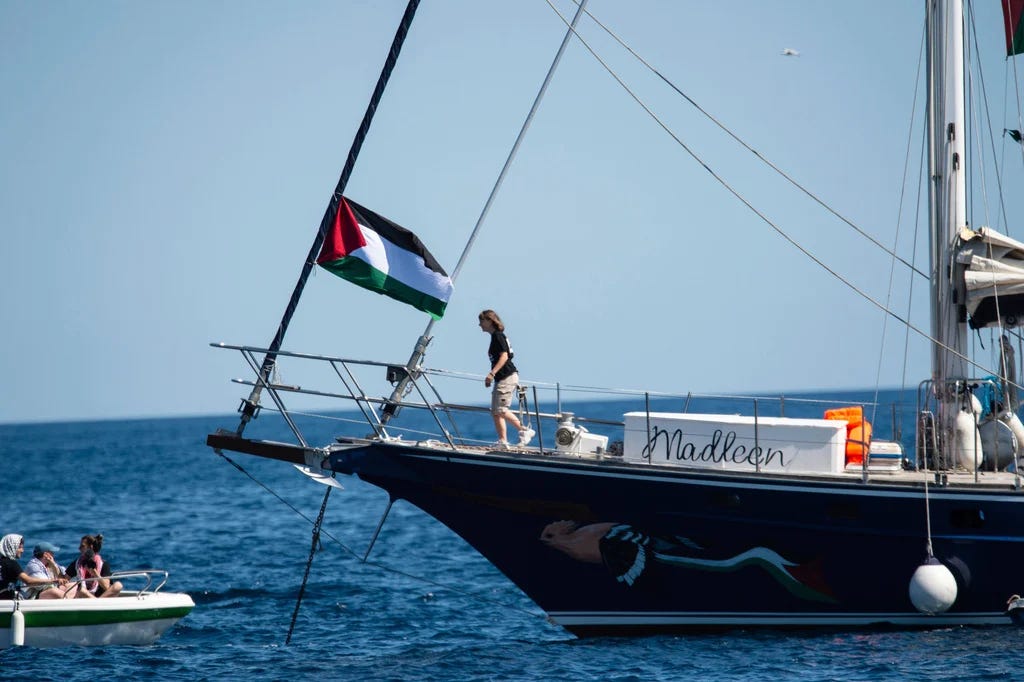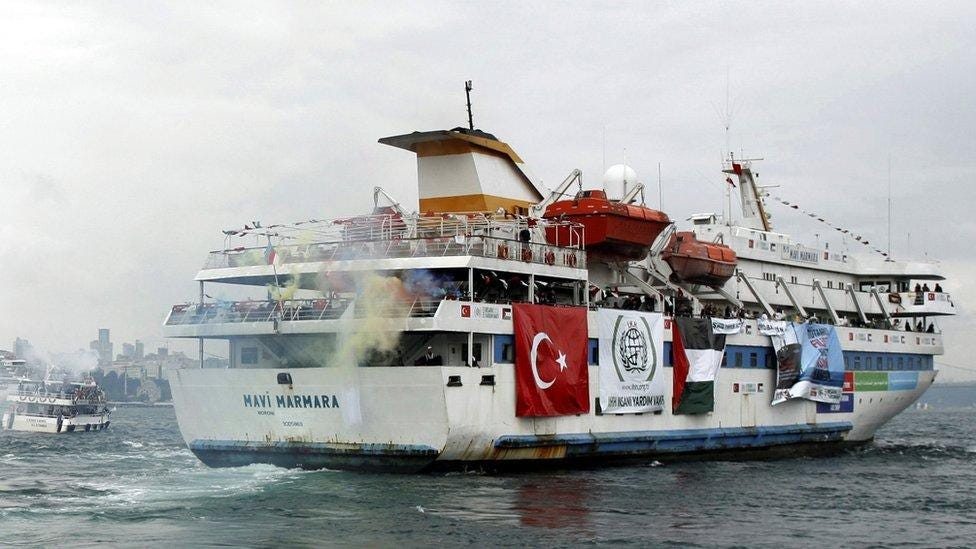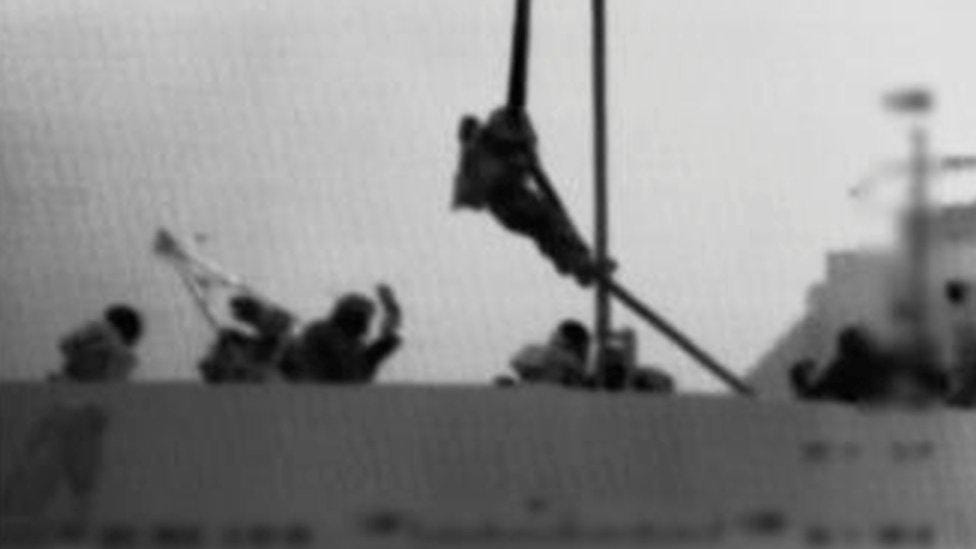Your Silence Is More Dangerous Than Breaking the Siege on Gaza
Greta Thunberg boarded that ship, knowing her high profile and celebrity would strengthen the mission's safety.
My biggest internal struggle over the past twenty months has been finding the words to explain to those silent about the livestreamed genocide in Gaza just how dangerous their silence is. The collection sounds something like this:
“But I don’t have many followers, who would I inform?”
“I don’t talk about politics, I can’t start now.”
“I’m not posting or talking about this genocide, but I’m doing things for Gaza behind closed doors” (they aren’t).
“I’m a mother, so watching kids being blown up to pieces is too much for me. I just can’t deal with it, emotionally.”
My response is usually embarrassingly naive: “Well, isn’t that the biggest reason on earth to actually care and do more for someone else’s kids being blown to…?”
Forget it.
They never listen, and my cortisol spikes every time I try to explain that their silence isn’t just inaction—it’s dangerous. When enough people choose not to speak, those of us who do are left exposed, outnumbered, and easy to target—doxxed, threatened, stripped of opportunities. That stubborn silence has built an undisturbed little nest right in our collective living room—a comfortable kind of consent that allowed genocide to unfold.
And we watched it unfold. In real time. A genocide, livestreamed on one side of the screen, and on the other, people who just aren’t that bothered by non-Westerners being bombed.
What happened next is quite extraordinary, an event that will be remembered for generations to come. Greta Thunberg, a 22-year-old Westerner who could have easily cruised around the world for the rest of her life, chatting about climate change while pocketing billions; unbothered, adored—instead, she chose to school your friends, your family, the UN, politicians, governments, and international courts on courage and what’s left of humanity by quietly rolling up onto the Gaza Freedom Flotilla sailboat.
But before she did, she addressed the world—especially those questioning whether she was afraid, given that Israel had killed nine activists aboard the Mavi Marmara in 2010 and had struck the previous Freedom Flotilla vessel, Conscience, with a drone in international waters near Malta just a month ago.
Greta’s words are clear and unadorned—the cadence of neurodivergence, and impossible to ignore:
"No matter how dangerous this mission is, it’s not even near as dangerous as the silence of the entire world in the face of the livestreamed genocide.”
If you’ve never felt shame for your lack of rage as an entire people were exterminated before your eyes, unmoved to share and amplify their plight to force governments to stop gunning them down with your tax dollars, now is the time.
Muhammad Shehada explains why talking publicly and protesting about this genocide is paramount in stopping it. He lays out ways the people who refused to stay silent and inactive moved the needle and ultimately changed the tide on support for Israel, a perpetrator:
“Western governments expected that the anti-genocide movement and the protest would die out, counting on our fatigue due to the repetition of atrocities and no end in sight, as well as a mix of police crackdown and suppressive tactics.
What we see now that is draconian unraveling everything that Europe is supposed to stand for in terms of suppression going after individuals to intimidate terrorize and and kill a movement in its butt. But that didn't work. They expected this movement to fade away to become quiet, and disappear. But the opposite happened.”
Our speaking out and relentless protesting, risking jobs, diplomas, careers, freedoms, and futures—is why the tide changed. Those who rule us could no longer excuse the sheer number of war crimes or the unwavering efforts of people continuing to expose them.
This is how impactful and damaging your silence is.
So much so that Greta Thunberg fears your silence more than stepping onto a Freedom Flotilla—despite one of its boats being hit by a drone just a month ago, and another attacked in 2010, when nine humanitarians were killed.
I think it’s time you did the bare minimum—speak out, share, and amplify their mission; it’s imperative for their safety.
What is the Gaza Freedom Flotilla, and why is it an IMPERATIVE that you support it?
The Freedom Flotilla Coalition (FFC) is a grassroots people-to-people solidarity movement composed of campaigns and initiatives from different parts of the world, working together to end the illegal Israeli blockade of Gaza. It’s a non-violent, direct action to challenge Israel's illegal siege and escalating war crimes.
In FCC's own words:
“We Challenge the Blockade – By sailing vessels to Gaza, we confront Israel’s illegal siege and demonstrate that this blockade constitutes collective punishment of a civilian population, violating internationally recognized rights, including the right to freedom of movement.
We Expose the Nature of the Occupation – Through peaceful, civilian-led missions, we reveal the violent and unlawful behavior of Israeli occupation forces. These include hijacking our vessels and forcibly transporting them to occupied Palestine, assaulting unarmed volunteers, seizing personal belongings, and medical supplies bound for Palestinians in Gaza. Israel’s hostile responses to our missions reflect a wider, ongoing brutality inflicted upon civilians in Gaza on a daily basis.”
Mavi Marmara.
Why did Israel stop the Gaza Flotilla in 2010, a vessel carrying 10,000 tonnes of goods, including school supplies, building materials, and two large electricity generators for people in Gaza, under blockade? Check out this mind-boggling feature by the BBC, trying to convince the public that the Israeli commandos who descended on a ship on ropes from helicopters came to contain the “terrorists on board” and executed nine activists in “self-defence”.
In September 2010, a UN Human Rights Council report said Israel's military broke international laws, that the action by commandos, which left nine dead, was "disproportionate" and "betrayed an unacceptable level of brutality". Israel rejected the report as "biased" and "one-sided".
Commandos who are also victims.
If you are stunned by the journalistic malpractice of the New York Times and the Washington Post today in reporting about the genocide in Gaza, take a look at what kind of nonsense the BBC printed 15 years ago:
“The Israeli commandos faced significant, organised, and violent resistance.”
Israeli commandos executed 9 people with multiple bullets to their heads and chest—activists, on board to deliver aid. The 10th person died a few years later due to the sustained injuries. Then, as today, bringing aid to the starving population under the blockade is an act Israel finds offensive and something it should defend itself from.
Madleen.
The unfortunate mistake the crew and activists on the Mavi Marmara made was embarking on a mission to break the blockade of Gaza and deliver aid to a besieged population—without letting the world know. They didn’t have support on the outside. Israel, known to commit atrocities and war crimes while counting on the world’s unawareness, never allows international journalists to report independently on its actions. But 15 years later, with smartphones in hand and social media as a megaphone, the crew aboard the Madleen, now sailing toward Gaza, is better prepared.
And most importantly—they have us.
The 12 people aboard, the support team on the outside, and all of us amplifying their location, progress, and message are actively ensuring their literal, physical safety.
Greta Thunberg boarded that ship, knowing her high profile and celebrity would strengthen the mission's safety. She quite literally put her life on the line to deliver aid to a starving population and draw the world’s attention to Israel’s illegal blockade of Gaza.
People on the board of Madleen vessel are:
Baptiste Andre 🇫🇷, Greta Thunberg 🇸🇪, Şuayb Ordu 🇹🇷, Mark van Rennes 🇳🇱, Omar Faiad 🇫🇷, Pascal Maurieras 🇫🇷, Reva Viard 🇫🇷, Rima Hassan 🇫🇷, Sergio Toribio 🇪🇸, Thiago Ávila 🇧🇷, Yanis Mhamdi 🇫🇷, and Yasemin Acar 🇩🇪.
People on the board of the Gaza Freedom Flotilla Coalition, and the outside support, are:
Alana Hadid, Susan Sarandon, Daniel Machover, Abby Martin, Brian Eno, Max Porter, Aiysha Hart, Greta Thunberg, Liam Cunningham, Indya Moore, Guy Pearce, Rahma Zein, Maxine Peake, Melissa Barrera, Lisa Moorish, Nicole Jenes, Juliet Stevenson, Misan Harriman, Khalid Abdalla, Nan Goldin, Susan Abulhawa, Del Naja, and Carice Van Houten.
Follow @gazafreedomflotilla coalition for updates. You can track the boat here.
SHARE. SPEAK. AMPLIFY. FOLLOW.





